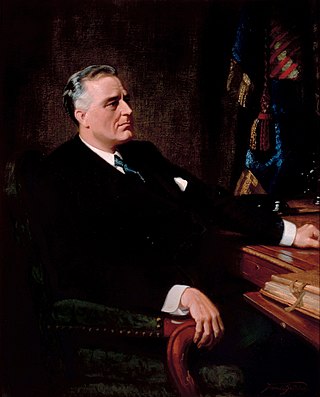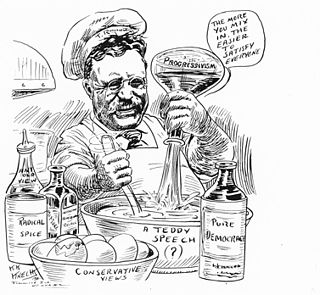
Franklin Delano Roosevelt, commonly known by his initials FDR, was an American politician who served as the 32nd president of the United States from 1933 until his death in 1945. The longest serving U.S. president, he is the only president to have served more than two terms. His initial two terms were centered on combating the Great Depression, while his third and fourth saw him shift his focus to America's involvement in World War II.

The Four Freedoms were goals articulated by U.S. President Franklin D. Roosevelt on Monday, January 6, 1941. In an address known as the Four Freedoms speech, he proposed four fundamental freedoms that people "everywhere in the world" ought to enjoy:
- Freedom of speech and expression
- Freedom of worship
- Freedom from want
- Freedom from fear

The 1936 United States presidential election was the 38th quadrennial presidential election, held on Tuesday, November 3, 1936. In the midst of the Great Depression, incumbent Democratic President Franklin D. Roosevelt defeated Republican governor Alf Landon of Kansas in a landslide victory. Roosevelt won the highest share of the popular vote (60.8%) and the electoral vote since the largely uncontested 1820 election. The sweeping victory consolidated the New Deal Coalition in control of the Fifth Party System.

Alfred Mossman Landon was an American oilman and politician who served as the 26th governor of Kansas from 1933 to 1937. A member of the Republican Party, he was the party's nominee in the 1936 presidential election, and was defeated in a landslide by incumbent president Franklin D. Roosevelt. The margin of victory in the electoral college was the largest of Roosevelt's 4 elections to the office of president, as Landon won just 8 electoral votes to Roosevelt's 523. Landon lived to the age of 100 and died in October 1987. Landon would be the only presidential candidate from either party to live to 100 until Jimmy Carter in 2024 and Landon is the only Republican to do so.

The fireside chats were a series of evening radio addresses given by Franklin D. Roosevelt, the 32nd President of the United States, between 1933 and 1944. Roosevelt spoke with familiarity to millions of Americans about recovery from the Great Depression, the promulgation of the Emergency Banking Act in response to the banking crisis, the 1936 recession, New Deal initiatives, and the course of World War II. On radio, he quelled rumors, countered conservative-dominated newspapers, and explained his policies directly to the American people. His tone and demeanor communicated self-assurance during times of despair and uncertainty. Roosevelt was regarded as an effective communicator on radio, and the fireside chats kept him in high public regard throughout his presidency. Their introduction was later described as a "revolutionary experiment with a nascent media platform."

The National Recovery Administration (NRA) was a prime agency established by U.S. president Franklin D. Roosevelt (FDR) in 1933. The goal of the administration was to eliminate "cut throat competition" by bringing industry, labor, and government together to create codes of "fair practices" and set prices. The NRA was created by the National Industrial Recovery Act (NIRA) and allowed industries to get together and write "codes of fair competition". The codes intended both to help workers set minimum wages and maximum weekly hours, as well as minimum prices at which products could be sold. The NRA also had a two-year renewal charter and was set to expire in June 1935 if not renewed.

The Four Freedoms Award is an annual award presented to "those men and women whose achievements have demonstrated a commitment to those principles which US President Franklin Delano Roosevelt proclaimed in his Four Freedoms speech to the United States Congress on January 6, 1941, as essential to democracy: "freedom of speech and expression, freedom of worship, freedom from want, freedom from fear". The annual award is handed out in alternate years in New York City by the Roosevelt Institute to Americans and in Middelburg, Netherlands, by the Roosevelt Stichting to non-Americans.

The Second Bill of Rights or Bill of Economic Rights was proposed by United States President Franklin D. Roosevelt during his State of the Union Address on Tuesday, January 11, 1944. In his address, Roosevelt suggested that the nation had come to recognise and should now implement a "Second bill of rights". Roosevelt argued that the "political rights" guaranteed by the Constitution and the Bill of Rights had "proved inadequate to assure us equality in the pursuit of happiness". His remedy was to declare an "economic bill of rights" to guarantee these specific rights:
A New Covenant was a political slogan used by U.S. President Bill Clinton to describe his political philosophy and agenda. The term was used sporadically during the 1992 campaign and Clinton's terms in office to describe a "new social compact" between the United States Government and its citizens.

"Arsenal of Democracy" was the central phrase used by U.S. President Franklin D. Roosevelt in a radio broadcast on the threat to national security, delivered on December 29, 1940—nearly a year before the United States entered the Second World War (1939–1945). Roosevelt promised to help the United Kingdom fight Nazi Germany by selling them military supplies while the United States stayed out of the actual fighting. The president announced that intent a year before the Attack on Pearl Harbor, at a time when Germany had occupied much of Europe and threatened Britain.

Before, during and after his presidential terms and continuing today, there has been criticism of Franklin D. Roosevelt (1882–1945). His critics have questioned not only his policies and positions, but also accused him of trying to centralize power in his own hands by controlling both the government and the Democratic Party. Many denounced his breaking of a long-standing tradition by running for a third term in 1940.
The Conservative Manifesto was a position statement drafted in 1937 by a bipartisan coalition of conservative politicians in the United States. Those involved in its creation included longtime opponents of President Franklin Roosevelt's New Deal as well as former supporters who had come to believe its programs were proving ineffective.

The New Deal was a series of programs, public work projects, financial reforms, and regulations enacted by President Franklin D. Roosevelt in the United States between 1933 and 1938 to rescue the U.S. from the Great Depression. It was widely believed that the depression was caused by the inherent market instability and that government intervention was necessary to rationalize and stabilize the economy.

The first inauguration of Franklin D. Roosevelt as the 32nd president of the United States was held on Saturday, March 4, 1933, at the East Portico of the United States Capitol in Washington, D.C. This was the 37th inauguration, and marked the commencement of the first term of Franklin D. Roosevelt as president and John Nance Garner as vice president.

Theodore Roosevelt (1858–1919) was the 26th President of the United States (1901–1909) and also served as Governor of New York and Vice President. He is known for becoming a leading spokesman for his version of progressivism after 1890. However, author Daniel Ruddy argues in his book Theodore the Great: Conservative Crusader that Roosevelt was actually a "populist conservative" and a "Hamiltonian"—a conservative in the eighteenth century sense of the word. Similarly, Francis Fukuyama identifies Roosevelt, together with Alexander Hamilton, as part of a tradition of a strong-state conservatism in the United States.

The first 100 days of the Franklin D. Roosevelt presidency began on March 4, 1933, the day Franklin D. Roosevelt was inaugurated as the 32nd president of the United States. He had signaled his intention to move with unprecedented speed to address the problems facing the nation in his inaugural address, declaring: "I am prepared under my constitutional duty to recommend the measures that a stricken nation in the midst of a stricken world may require." Roosevelt's specific priorities at the outset of his presidency were getting Americans back to work, protecting their savings and creating prosperity, providing relief for the sick and elderly, and getting industry and agriculture back on their feet.
The Commonwealth Club Address was a speech made by New York Governor and Democratic presidential nominee Franklin Delano Roosevelt at the Commonwealth Club of California in San Francisco on his 1932 presidential campaign. Roosevelt said the era of growth and unrestricted entrepreneurship had ended, and the individualism must give way to collective action. He was not at all specific, but he hinted at liberal reforms of the sort that emerged in The First Hundred Days after his inauguration in March 1933. Scholars rate it among the 100 greatest speeches made by a President in the 20th century.
The 1938 State of the Union Address was given on Monday, January 3, 1938, by the 32nd United States president, Franklin D. Roosevelt. He stated,
The 1945 State of the Union Address was given to the 79th United States Congress on Saturday, January 6, 1945, by the 32nd President of the United States, Franklin D. Roosevelt. It was given in the year he died. It was given during the final year of World War II. He stated, "In considering the State of the Union, the war and the peace that is to follow are naturally uppermost in the minds of all of us. This war must be waged--it is being waged--with the greatest and most persistent intensity. Everything we are and have is at stake. Everything we are and have will be given. American men, fighting far from home, have already won victories which the world will never forget. We have no question of the ultimate victory. We have no question of the cost. Our losses will be heavy. We and our allies will go on fighting together to ultimate total victory."

The first term of the presidency of Franklin D. Roosevelt began on March 4, 1933, when he was inaugurated as the 32nd president of the United States, and the second term of his presidency ended on January 20, 1941, with his inauguration to a third term. Roosevelt, the Democratic governor of the largest state, New York, took office after defeating incumbent President Herbert Hoover, his Republican opponent in the 1932 presidential election. Roosevelt led the implementation of the New Deal, a series of programs designed to provide relief, recovery, and reform to Americans and the American economy during the Great Depression. He also presided over a realignment that made his New Deal Coalition of labor unions, big city machines, white ethnics, African Americans, and rural white Southerners dominant in national politics until the 1960s and defined modern American liberalism.













